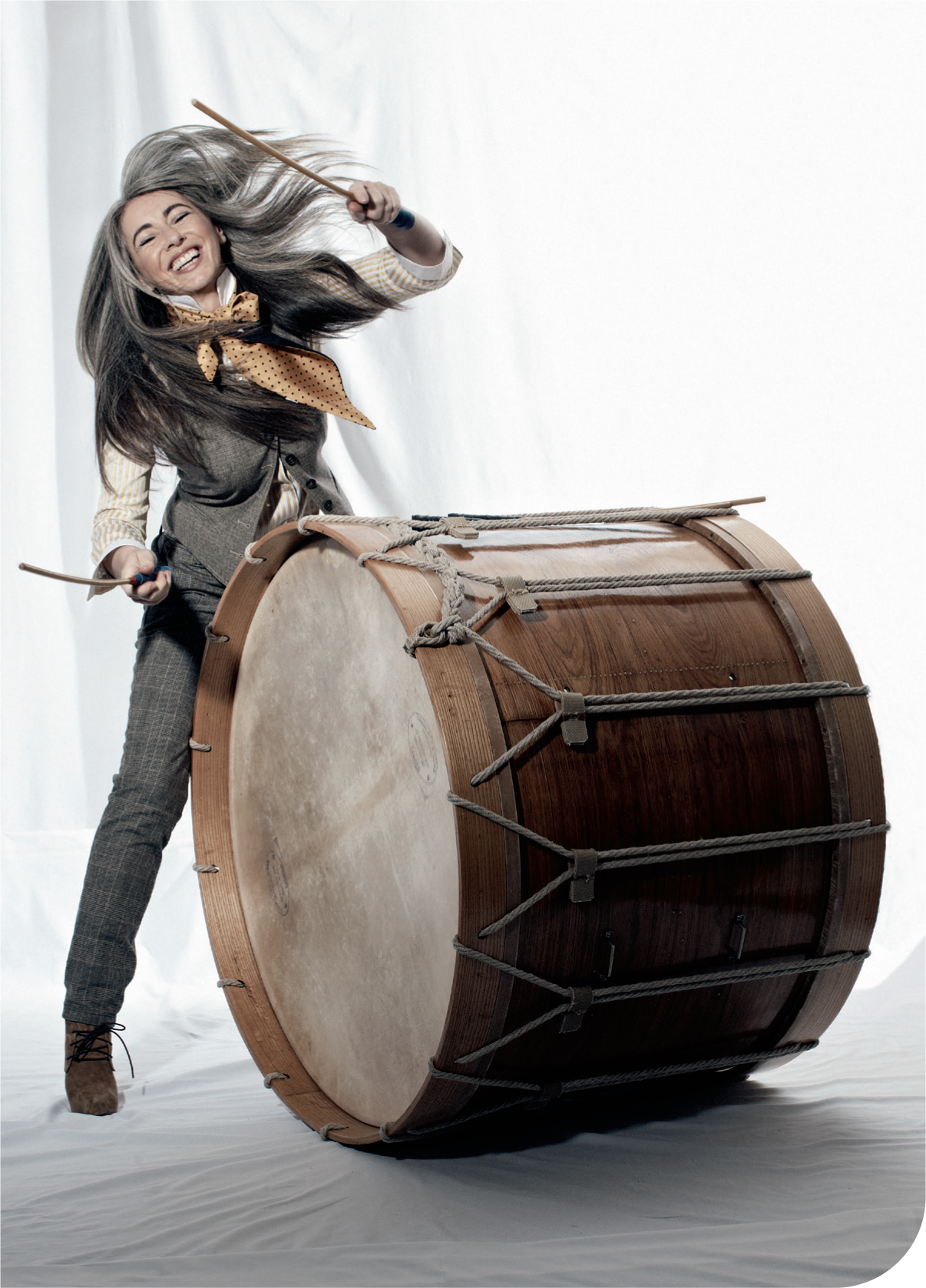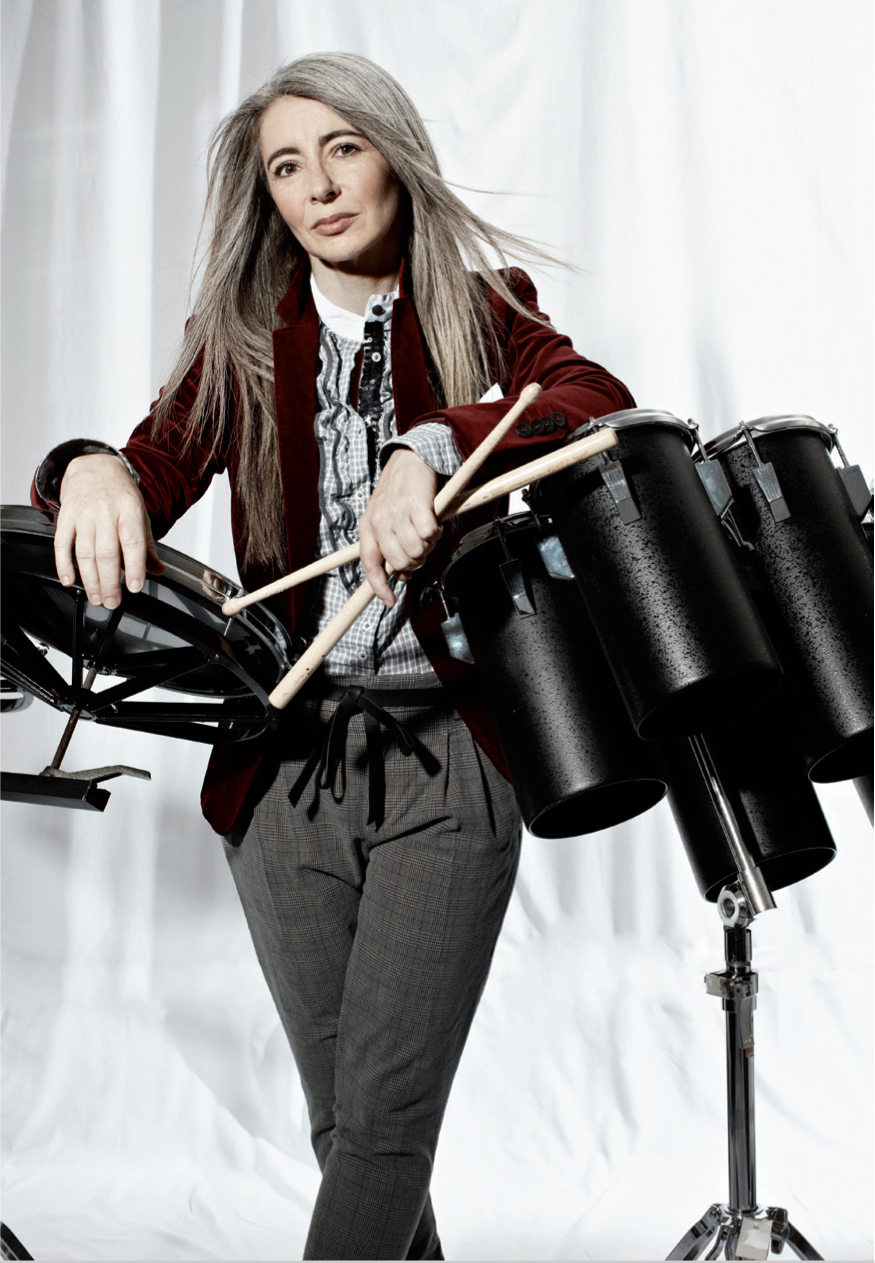
‘I wanted to study with James Blades because not only was he was a great percussionist, but because even though he was in his 80s, he was forward-thinking and a brilliant communicator’. These are the words of the world's most famous percussionist, Dame Evelyn Glennie, who chats with me on Zoom while nestled between a five-octave marimba and some of the 2,000 instruments she has crammed into her studio at her Cambridgeshire home.
A Grammy award-winning artist, who studied with James Blades at the Royal Academy of Music, she has recently added a new chapter and foreword to the book Percussion Instruments and their History, penned by Blades over 50 years ago. Affectionately known in the profession as the ‘bible’ due to it being the only book of its kind, it has recently been updated with additional chapters by Glennie and Neil Percy, principal percussionist of the London Symphony Orchestra.
‘Over the last few decades, there has been an explosion of different percussion performances, and of course, we now have percussion concertos,’ she muses, which gives us a glimpse of what the new release has in store. But the additional chapter, featuring solo percussion, would not have been written if it were not for a farmer's daughter pushing the boundaries and putting percussion firmly on the map as a solo instrument.
A career of ‘firsts’
Until Dr, professor, Dame Evelyn (yes, she has the full set) burst onto the scene as the first solo percussionist to play at the BBC Proms in 1989, percussion was not seen as a solo instrument. Through her determination, she became the world's first person to have a career as a solo percussionist. For the first ten years of her career, almost every performance she gave was a first – the first time an orchestra performed a percussion concerto, the first solo percussion performance at a particular venue, or the world premiere of a new piece.
When asked why it took so long for the music industry to wake up and recognise percussion as a solo instrument, Glennie is remarkably nonchalant. ‘The industry had got too comfortable, and people had to think outside of the box,’ she comments. ‘I was really frustrated that percussion was not included in the BBC Young Musician competition, so I bombarded the director with letters, and he eventually allowed me to give him a 30-minute recital – at my own expense – to prove there was enough repertoire available to include percussion in the competition.’
Thankfully, she proved her point, and the percussion category was launched in 1994. Over the years, numerous contestants have performed some of the 150 solo pieces she has commissioned or composed, although it is worth noting that none of the percussion finalists has been a woman, which makes her rise to stardom even more remarkable.
Despite being a global superstar, she is someone who does it all, with recent work focusing on charitable organisations. Since May 2020, she has been president of charity Help Musicians, formerly known as the Musicians Benevolent Fund. Following in the footsteps of Sir Edward Elgar and Sir Peter Maxwell Davies, she is the third president and the only woman in the charity's history. With her trademark Aberdonian lilt, she explains, ‘It is such an extraordinary organisation. It does not just help financially but works with musicians of all ages to provide support – not just financial but with wellbeing too. The support network is incredible, and the charity links with other organisations to provide whatever support is needed. They are currently on phase four of their Financial Hardship Funding, which is remarkable, and they have delivered over £15.5m of funding since March 2020.’

© Philipp Rathmer
Spirit of inclusion
Although ‘Brand-Evelyn’ is international – there are podcasts, TED talks, jewellery lines, books, T-shirts and even water bottles – she is never far from her Scottish roots and is now ambassador of Sistema Scotland. During the pandemic, the organisation has hosted more than 9,000 online lessons as part of its Big Noise programme, and Glennie is incredibly proud of all its work.
‘The organisation focuses on creativity and inclusivity. The programmes are open to all children, and thanks to technology, we have been able to open up to everyone,’ she says. Having lost her hearing during childhood, she feels strongly about inclusivity, noting that the Royal Academy of Music initially rejected her application due to her deafness. It went against the spirit of inclusion she had experienced during her childhood which has had a lasting impact.
‘Sistema Scotland can help families who do not have access to Wi-Fi or technology, and along with group consultations, we have been able to ensure our sessions are now accessible to all. This allows people to be independent and involved, even if we need to provide technology or someone to sign for D/deaf participants, for example. They must be included and feel included as a member of society.’
Collaboration and communication are recurring themes in our conversation. ‘Don't work in isolation’ is something Glennie mentions on several occasions, with equality, inclusivity and accessibility being the cornerstones of her work. Her rise from the small village of Methlick to the bright lights of London are well documented. Yet, she has never lost sight of the opportunities given to her during her childhood, particularly the unfailing support of her percussion teacher, Ron Forbes. He was the one who taught her to listen with other parts of her body as she grappled with her hearing loss.
Linking creativity
Inspired to nurture budding percussionists, she has always enjoyed working with students and relished her work at what is now known as the Royal Conservatoire of Scotland (RCS). ‘Years ago, when Martin Gibson and Pamela Dow were teaching at the RCS, they used to invite me into work with their students, and the masterclasses were always open to the public. It was lovely for people to watch the students grow and develop over the years. Like James Blades, they were keen for their students to be outward thinking, which appealed to me. I am also impressed with the younger generation setting up websites such as PercWorks, which allows students access to masterclasses and workshops with professionals.’
A keen supporter of organisations close to her childhood home in Aberdeen, it was announced in April 2021 that she would be taking on the role of chancellor at Aberdeen's Robert Gordon University (RGU). She chuckles when I ask whether she is looking to inspire the next generation of musicians – it is evident that she has big plans and, in true Glennie style, wants to get stuck in, have an impact and put RGU on the map. ‘Robert Gordon has been traditionally known as an organisation for business, technical and medical courses. Yes, I want to champion the arts, but I am keen to link creativity to all the departments. Wellbeing is so important too. I want there to be excellent staff wellbeing as this feeds into the student experience.’ What is clear is how much Glennie values communication, as she talks animatedly about what she calls ‘the triangle’. ‘What are so important are the three sides of the triangle: business, creativity and wellbeing. I am keen to work with the 11 faculties and see them communicate and work together to raise the profile of the University regionally, nationally and internationally.’
By her own admission, she has spent a lot of time breaking down barriers, and fighting for music education is one of them. In the early 2000s, there was very little money available to support basic activities or a thorough music education in state schools. Glennie, Julian Lloyd Webber, Sir James Galway, and Michael Kamen formed the ‘Music in Education Consortium’. After persistent and successful lobbying, at the end of 2007, the UK government pledged no less than £332m for music education.
When I ask if she feels more needs to be done to support the arts subjects in schools in the face of a declining number of students studying music at A Level, I am met with a resounding ‘Yes!’ Glennie continues: ‘The arts are so important to society, the economy, wellbeing, communication and communities. Music can bring together all these elements.’
As our interview comes to an end, it feels as if we have only scratched the surface of what truly drives the former Scotswoman of the Decade, but one thing is certain, James Blades' influence continues to guide her. She is undoubtedly a great percussionist, forward-thinking and a brilliant communicator, just like her mentor.
 © Philipp Rathmer
© Philipp Rathmer
Percussion Instruments and their History is available from www.kahnandaverill.co.uk.








